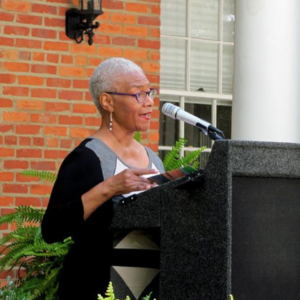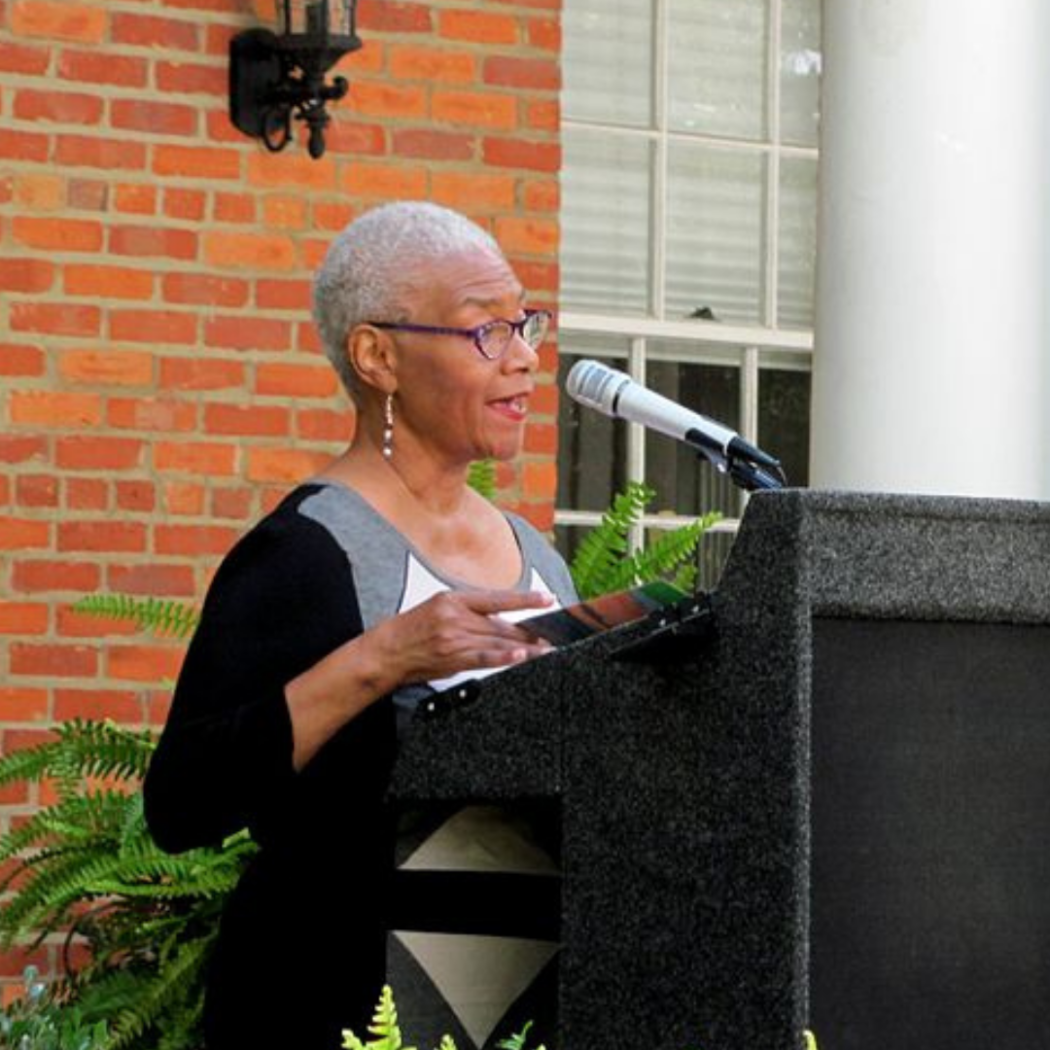 North Carolina Poet Laureate Jaki Shelton Green has a plan for her second term: she wants to induct a student poet laureate in every high school across the state. With 100 counties in North Carolina and some with as many as a dozen schools, that’s a lot of poets laureate. In fact, Google reports a total of 981 high schools in NC. If Green succeeds, appreciation for poetry will rise considerably as 981 new ambassadors spill out across the state.
North Carolina Poet Laureate Jaki Shelton Green has a plan for her second term: she wants to induct a student poet laureate in every high school across the state. With 100 counties in North Carolina and some with as many as a dozen schools, that’s a lot of poets laureate. In fact, Google reports a total of 981 high schools in NC. If Green succeeds, appreciation for poetry will rise considerably as 981 new ambassadors spill out across the state.
In a recent visit to Davidson County and Lexington, Green met with students at North Davidson Middle School, encouraging them to write their own poems. Her rapport with the young is enthusiastic. “They were wonderful,” she said afterwards.
Helping to develop young poets is her job as our state’s ambassador of poetry, Green believes. She takes her job seriously.
Green is the state’s 9th poet laureate since 1948, the third woman, and the first African American to hold the
position. She was first appointed in 2019 and has just been reappointed by Governor Roy Cooper for a second two-year term.
In North Carolina, we have much to celebrate, for both our state laureate, Green, and our national laureate, Joy Harjo, arewomen representing minority populations. Harjo, a member of the Muscogee (Creek) Nation, is currently serving her second term as 23rd Poet Laureate of the United States.
Her signature project is to bring to light the tradition and current state of Native poetry. “Our communities innately shared and share poetry from before the founding of the United States to the present,” she writes on her website. Poetry is language, whether tribal, English, or other. “Poetry is a tool to uncover the miraculous in the ordinary.”
She’s collecting stories. Her website, and the site of the Library of Congress, which sponsors the laureateship, hosts a website called “Living Nations, Living Words: A Map of First Peoples Poetry,”
“I want this map to counter damaging false assumptions,” she writes, “that indigenous peoples of our country are often invisible or are not seen as human.”
Her work serves to bring people together in one voice. In “Eagle Poem,” she writes,
“We are truly blessed because we
Were born, and die soon within a
True circle of motion,
Like eagle rounding out the morning
Inside us.
We pray that it will be done
In beauty.
In beauty.”
But stop anyone on the street in Lexington, Greensboro, even Charlotte or Raleigh, and few people will be able to tell you who our state’s poet laureate is, much less our US poet laureate, even though they can tell you without hesitation who won the ACC tournament or the Master’s golf tournament.
Why don’t people know? Why do we even need a poet laureate? And why do we need a poet laureate in every school across the state, from little Tyrell County to giant Wake?
Poets write and preserve our culture. They put into words who we are, how we live, how we feel, and what we care about. Who would we be without Homer? Shakespeare? Wordsworth? Emily Dickinson? Edgar Allan Poe? Shel Silverstein? Dr. Seuss? Who would we be without Maya Angelou or Amanda Gorman?
Jaki Shelton Green, in an interview with poet Lauren K. Alleyne at James Madison University’s Furious Flower Poetry Center in 2021, addresses her role and experience as poet laureate. She says,
“What has been wonderfully different is that I really get to see how poetry, the literary arts, all the arts for me really do create this bridge, erect this amazing bridge, where if we’re willing, we can come on this bridge in all of our differences. “
Her own work almost prophetically speaks to that bridge. Green’s focus is often on her place—the rural South—and her responsibility to the earth and those around her. It’s a rich, haunting, spiritual style, devoid of strict punctuation or format but as free-flowing as Green herself.
In the poem, “who will be the messenger of this land,” though written in the early 2000s, she asks the question of herself and her work. In characteristically visual language, she asks,
“who will be the messenger of this land
count its veins
speak through the veins
translate the language of water
navigate the heels of lineage
who will carry this land in parcels
paper, linen, burlap
who will weep when it bleeds
and hardens
forgets to birth itself”
At the poem’s end, she answers her own question and seems to assume her responsibility as poet of the people across this state:
“we are the messengers
blue breath
red hands
singing a tree into dance”
With 981 high school age poets laureate across the state, Green is doing her part to make that bridge one we all can walk across together.
Barbara Presnell is a poet and essayist who lives in Lexington, NC. She is Senior Lecturer Emeritus in the Writing, Rhetoric, and Digital Studies Department at UNC-Charlotte.


There are no comments
Add yours